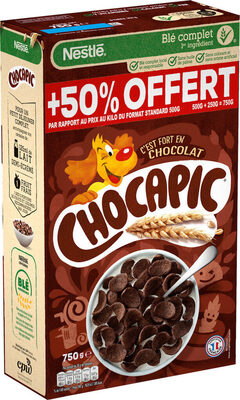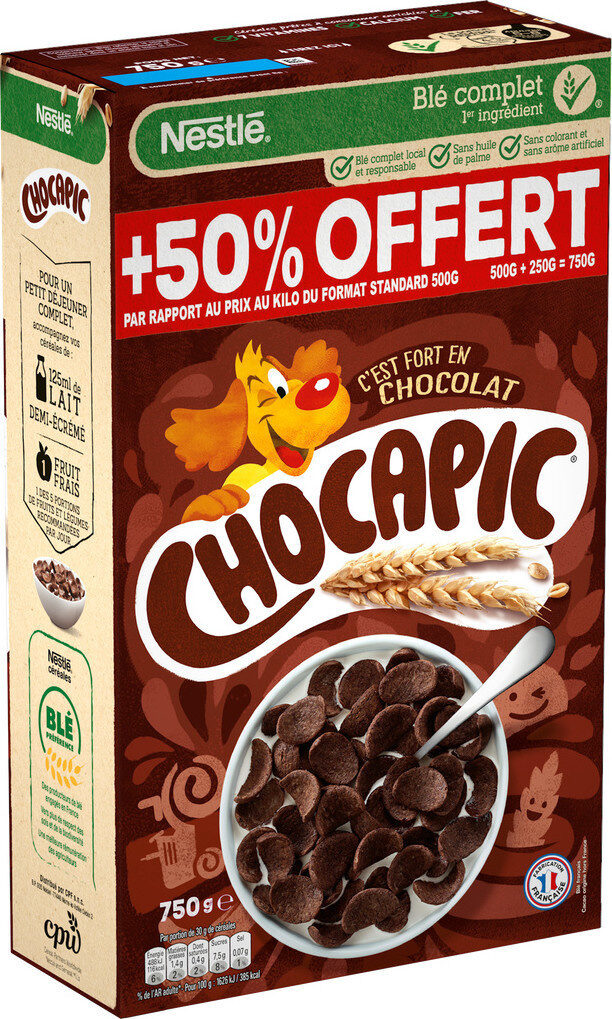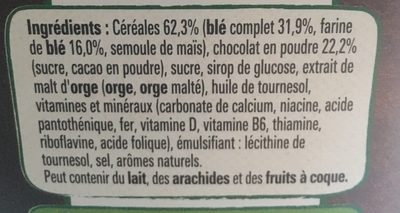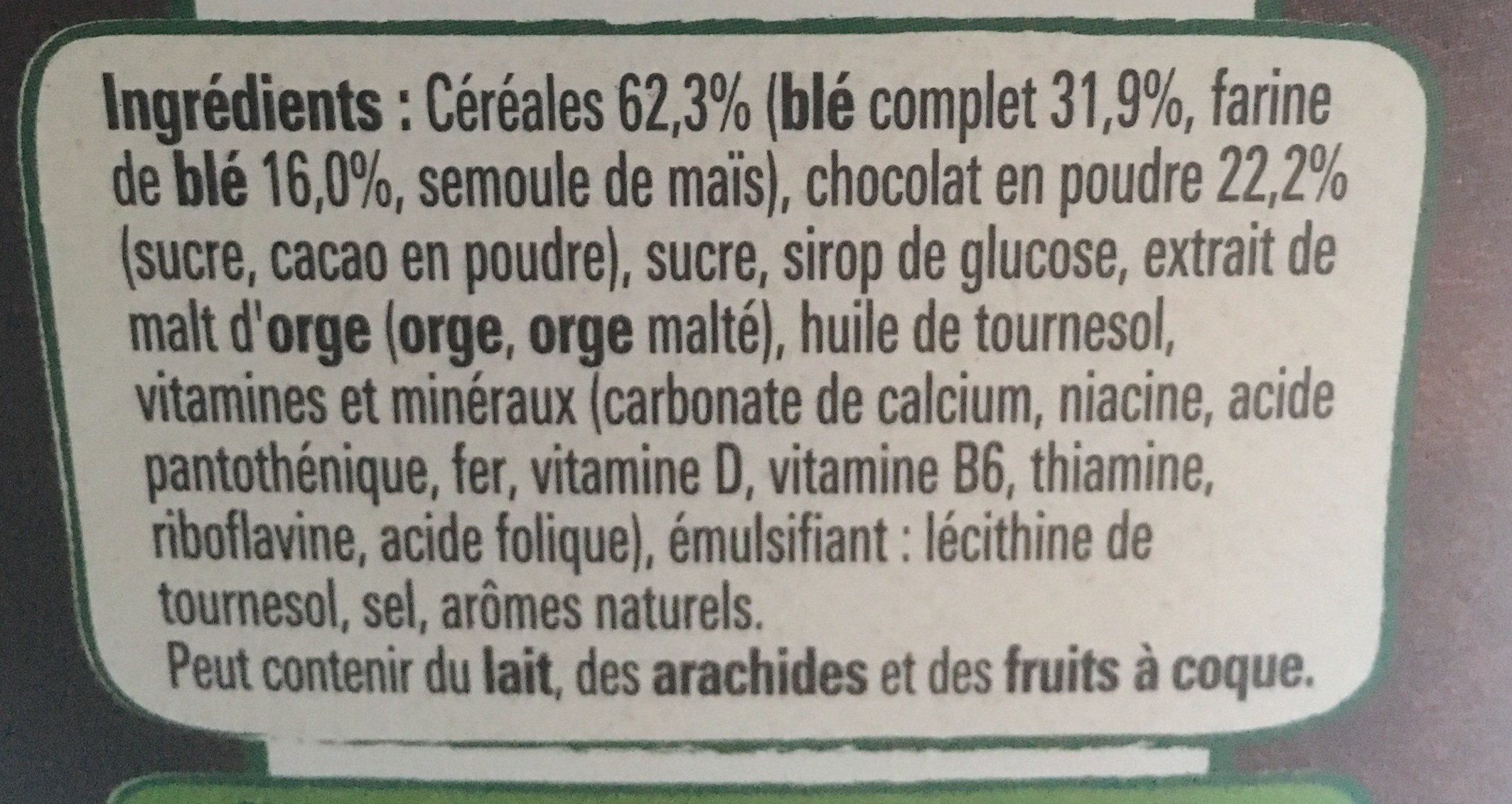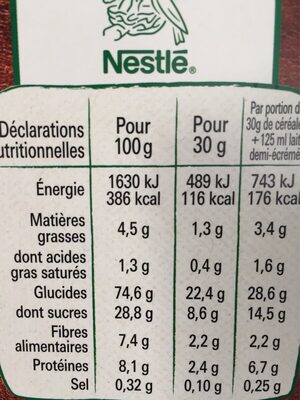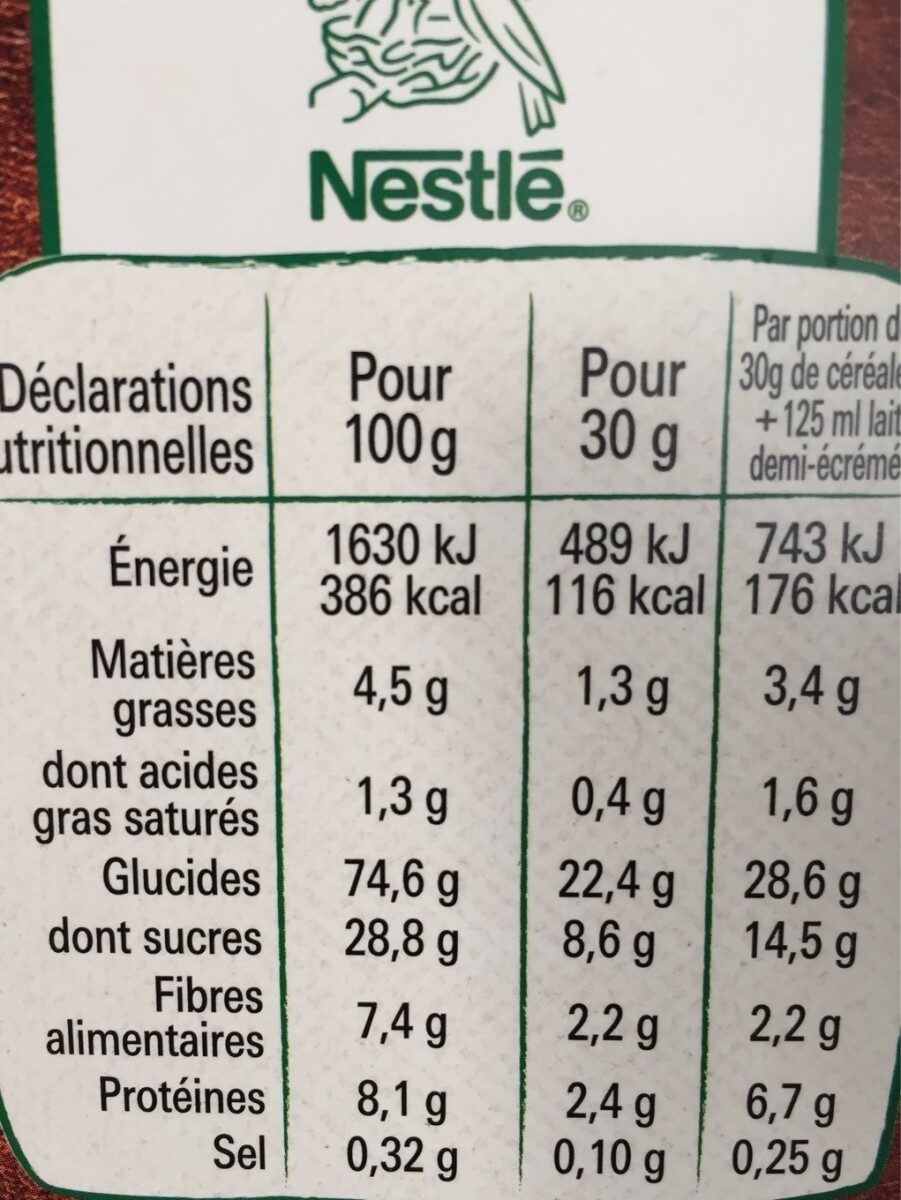Help us make food transparency the norm!
As a non-profit organization, we depend on your donations to continue informing consumers around the world about what they eat.
The food revolution starts with you!
Céréales petit-déjeuner chocolat - Nestlé - 750 g
Céréales petit-déjeuner chocolat - Nestlé - 750 g
This product page is not complete. You can help to complete it by editing it and adding more data from the photos we have, or by taking more photos using the app for Android or iPhone/iPad. Thank you!
×
Barcode: 7613034745286 (EAN / EAN-13)
Quantity: 750 g
Packaging: Plastic, Bag, Cardboard
Categories: Plant-based foods and beverages, Plant-based foods, Breakfasts, Cereals and potatoes, Cereals and their products, Breakfast cereals, Chocolate cereals, Extruded cereals, Chocolate wheat shells
Labels, certifications, awards: No artificial flavors, No colorings
Stores: Auchan
Matching with your preferences
Health
Ingredients
-
31 ingredients
French: Céréales 61,9 % (blé complet 31,8 %, farine de blé, semoule de maïs), chocolat en poudre 22,2 % (sucre, cacao en poudre), sucre, sirop de glucose, extrait de malt d'orge, huile de palme, émulsifiant : lécithine de tournesol, sel, arômes, vitamines (niacine (PP), acide pantothénique (B5), riboflavine (B2), vitamine B6, thiamine (B1), acide folique (B9), vitamine D) et minéraux (carbonate de calcium, fer).Allergens: GlutenTraces: Milk, Nuts, Peanuts
Food processing
-
Ultra processed foods
Elements that indicate the product is in the 4 - Ultra processed food and drink products group:
- Additive: E322 - Lecithins
- Ingredient: Emulsifier
- Ingredient: Flavouring
- Ingredient: Glucose
- Ingredient: Glucose syrup
Food products are classified into 4 groups according to their degree of processing:
- Unprocessed or minimally processed foods
- Processed culinary ingredients
- Processed foods
- Ultra processed foods
The determination of the group is based on the category of the product and on the ingredients it contains.
Additives
-
E322 - Lecithins
Lecithins are natural compounds commonly used in the food industry as emulsifiers and stabilizers.
Extracted from sources like soybeans and eggs, lecithins consist of phospholipids that enhance the mixing of oil and water, ensuring smooth textures in various products like chocolates, dressings, and baked goods.
They do not present any known health risks.
-
E322i - Lecithin
Lecithins are natural compounds commonly used in the food industry as emulsifiers and stabilizers.
Extracted from sources like soybeans and eggs, lecithins consist of phospholipids that enhance the mixing of oil and water, ensuring smooth textures in various products like chocolates, dressings, and baked goods.
They do not present any known health risks.
Ingredients analysis
-
Palm oil
Ingredients that contain palm oil: Palm oil
-
Vegan status unknown
Unrecognized ingredients: Thiamin, Thiamin, Folic acid, Folic acid, Vitamin D, Iron
-
Vegetarian status unknown
Unrecognized ingredients: Thiamin, Thiamin, Folic acid, Folic acid, Vitamin D, Iron
-
Details of the analysis of the ingredients
fr: Céréales 61.9% (_blé_ complet 31.8%, farine de _blé_, semoule de maïs), chocolat en poudre 22.2% (sucre, cacao en poudre), sucre, sirop de glucose, extrait de malt d'_orge_, huile de palme, émulsifiant (lécithine de tournesol), sel, arômes, vitamines, niacine, vitamine PP, acide pantothénique, vitamine B5, riboflavine, vitamine B2, vitamine B6, thiamine, vitamine B1, acide folique, vitamine B9, vitamine D, minéraux (carbonate de calcium, fer)- Céréales -> en:cereal - vegan: yes - vegetarian: yes - percent_min: 61.9 - percent: 61.9 - percent_max: 61.9
- _blé_ complet -> en:whole-wheat - vegan: yes - vegetarian: yes - ciqual_food_code: 9010 - percent_min: 31.8 - percent: 31.8 - percent_max: 31.8
- farine de _blé_ -> en:wheat-flour - vegan: yes - vegetarian: yes - ciqual_proxy_food_code: 9410 - percent_min: 15.05 - percent_max: 30.1
- semoule de maïs -> en:cornmeal - vegan: yes - vegetarian: yes - ciqual_food_code: 9615 - percent_min: 0 - percent_max: 15.05
- chocolat en poudre -> en:chocolate-powder - vegan: maybe - vegetarian: yes - ciqual_food_code: 18101 - percent_min: 22.2 - percent: 22.2 - percent_max: 22.2
- sucre -> en:sugar - vegan: yes - vegetarian: yes - ciqual_proxy_food_code: 31016 - percent_min: 11.1 - percent_max: 22.2
- cacao en poudre -> en:cocoa-powder - vegan: yes - vegetarian: yes - ciqual_food_code: 18100 - percent_min: 0 - percent_max: 11.1
- sucre -> en:sugar - vegan: yes - vegetarian: yes - ciqual_proxy_food_code: 31016 - percent_min: 0.757142857142857 - percent_max: 15.9
- sirop de glucose -> en:glucose-syrup - vegan: yes - vegetarian: yes - ciqual_proxy_food_code: 31016 - percent_min: 0 - percent_max: 7.95000000000001
- extrait de malt d'_orge_ -> en:barley-malt-extract - vegan: yes - vegetarian: yes - percent_min: 0 - percent_max: 5.3
- huile de palme -> en:palm-oil - vegan: yes - vegetarian: yes - from_palm_oil: yes - ciqual_food_code: 16129 - percent_min: 0 - percent_max: 3.975
- émulsifiant -> en:emulsifier - percent_min: 0 - percent_max: 3.18
- lécithine de tournesol -> en:sunflower-lecithin - vegan: yes - vegetarian: yes - percent_min: 0 - percent_max: 3.18
- sel -> en:salt - vegan: yes - vegetarian: yes - ciqual_food_code: 11058 - percent_min: 0 - percent_max: 0.22
- arômes -> en:flavouring - vegan: maybe - vegetarian: maybe - percent_min: 0 - percent_max: 0.22
- vitamines -> en:vitamins - vegan: yes - vegetarian: yes - percent_min: 0 - percent_max: 0.22
- niacine -> en:e375 - vegan: maybe - vegetarian: maybe - percent_min: 0 - percent_max: 0.22
- vitamine PP -> en:e375 - vegan: maybe - vegetarian: maybe - percent_min: 0 - percent_max: 0.22
- acide pantothénique -> en:pantothenic-acid - vegan: yes - vegetarian: yes - percent_min: 0 - percent_max: 0.22
- vitamine B5 -> en:pantothenic-acid - vegan: yes - vegetarian: yes - percent_min: 0 - percent_max: 0.22
- riboflavine -> en:e101 - vegan: maybe - vegetarian: yes - percent_min: 0 - percent_max: 0.22
- vitamine B2 -> en:e101 - vegan: maybe - vegetarian: yes - percent_min: 0 - percent_max: 0.22
- vitamine B6 -> en:vitamin-b6 - vegan: yes - vegetarian: yes - percent_min: 0 - percent_max: 0.22
- thiamine -> en:thiamin - percent_min: 0 - percent_max: 0.22
- vitamine B1 -> en:thiamin - percent_min: 0 - percent_max: 0.22
- acide folique -> en:folic-acid - percent_min: 0 - percent_max: 0.22
- vitamine B9 -> en:folic-acid - percent_min: 0 - percent_max: 0.22
- vitamine D -> en:vitamin-d - percent_min: 0 - percent_max: 0.22
- minéraux -> en:minerals - percent_min: 0 - percent_max: 0.22
- carbonate de calcium -> en:e170i - vegan: maybe - vegetarian: maybe - percent_min: 0 - percent_max: 0.22
- fer -> en:iron - percent_min: 0 - percent_max: 0.11
- Céréales -> en:cereal - vegan: yes - vegetarian: yes - percent_min: 61.9 - percent: 61.9 - percent_max: 61.9
Nutrition
-
Good nutritional quality
⚠ ️Warning: the amount of fruits, vegetables and nuts is not specified on the label, it was estimated from the list of ingredients: 0This product is not considered a beverage for the calculation of the Nutri-Score.
Positive points: 10
- Proteins: 5 / 5 (value: 8.6, rounded value: 8.6)
- Fiber: 5 / 5 (value: 6.2, rounded value: 6.2)
- Fruits, vegetables, nuts, and colza/walnut/olive oils: 0 / 5 (value: 0, rounded value: 0)
Negative points: 10
- Energy: 4 / 10 (value: 1611, rounded value: 1611)
- Sugars: 5 / 10 (value: 25, rounded value: 25)
- Saturated fat: 1 / 10 (value: 1.3, rounded value: 1.3)
- Sodium: 0 / 10 (value: 88, rounded value: 88)
The points for proteins are counted because the negative points are less than 11.
Nutritional score: (10 - 10)
Nutri-Score:
-
Nutrient levels
-
Fat in moderate quantity (4.6%)
What you need to know- A high consumption of fat, especially saturated fats, can raise cholesterol, which increases the risk of heart diseases.
Recommendation: Limit the consumption of fat and saturated fat- Choose products with lower fat and saturated fat content.
-
Saturated fat in low quantity (1.3%)
What you need to know- A high consumption of fat, especially saturated fats, can raise cholesterol, which increases the risk of heart diseases.
Recommendation: Limit the consumption of fat and saturated fat- Choose products with lower fat and saturated fat content.
-
Sugars in high quantity (25%)
What you need to know- A high consumption of sugar can cause weight gain and tooth decay. It also augments the risk of type 2 diabetes and cardio-vascular diseases.
Recommendation: Limit the consumption of sugar and sugary drinks- Sugary drinks (such as sodas, fruit beverages, and fruit juices and nectars) should be limited as much as possible (no more than 1 glass a day).
- Choose products with lower sugar content and reduce the consumption of products with added sugars.
-
Salt in low quantity (0.22%)
What you need to know- A high consumption of salt (or sodium) can cause raised blood pressure, which can increase the risk of heart disease and stroke.
- Many people who have high blood pressure do not know it, as there are often no symptoms.
- Most people consume too much salt (on average 9 to 12 grams per day), around twice the recommended maximum level of intake.
Recommendation: Limit the consumption of salt and salted food- Reduce the quantity of salt used when cooking, and don't salt again at the table.
- Limit the consumption of salty snacks and choose products with lower salt content.
-
-
Nutrition facts
Nutrition facts As sold
for 100 g / 100 mlAs sold
per serving (30 g)Compared to: Chocolate wheat shells Energy 1,611 kj
(385 kcal)483 kj
(116 kcal)- Fat 4.6 g 1.38 g +31% Saturated fat 1.3 g 0.39 g -6% Carbohydrates 73 g 21.9 g -3% Sugars 25 g 7.5 g -2% Fiber 6.2 g 1.86 g -4% Proteins 8.6 g 2.58 g -4% Salt 0.22 g 0.066 g -37% Vitamin D 3 µg 0.9 µg -33% Vitamin B1 (Thiamin) 0.93 mg 0.279 mg +9% Vitamin B2 (Riboflavin) 1.27 mg 0.381 mg +7% Vitamin B3/PP (Niacin) 13.8 mg 4.14 mg +5% Vitamin B6 (Pyridoxin) 1.26 mg 0.378 mg +7% Vitamin B9 (Folic acid) 176 µg 52.8 µg +4% Vitamin B5 (Pantothenic acid) 5.23 mg 1.57 mg - Calcium 479 mg 144 mg +8% Iron 11.7 mg 3.51 mg +29% Fruits‚ vegetables‚ nuts and rapeseed‚ walnut and olive oils (estimate from ingredients list analysis) 0 % 0 %
Environment
-
Eco-Score E - Very high environmental impact
⚠ ️Select a country in order to include the full impact of transportation.The Eco-Score is an experimental score that summarizes the environmental impacts of food products.→ The Eco-Score was initially developped for France and it is being extended to other European countries. The Eco-Score formula is subject to change as it is regularly improved to make it more precise and better suited to each country.Life cycle analysis
-
Average impact of products of the same category: C (Score: 45/100)
Category: Breakfast cereals, mix of puffed or extruded cereals, fortified with vitamins and chemical elements
Category: Breakfast cereals, mix of puffed or extruded cereals, fortified with vitamins and chemical elements
- PEF environmental score: 0.63 (the lower the score, the lower the impact)
- including impact on climate change: 3.50 kg CO2 eq/kg of product
Stage Impact Agriculture
78.9 %Processing
12.6 %Packaging
3.8 %Transportation
3.9 %Distribution
0.8 %Consumption
0.0 %
Bonuses and maluses
-
Missing origins of ingredients information
Malus: -5
⚠ ️ The origins of the ingredients of this product are not indicated.
If they are indicated on the packaging, you can modify the product sheet and add them.
If you are the manufacturer of this product, you can send us the information with our free platform for producers.
-
Ingredients that threatens species
Malus: -10
Contains palm oil
Tropical forests in Asia, Africa and Latin America are destroyed to create and expand oil palm tree plantations. The deforestation contributes to climate change, and it endangers species such as the orangutan, the pigmy elephant and the Sumatran rhino.
-
Packaging with a medium impact
Malus: -11
Shape Material Recycling Impact Bag Plastic High Unknown Cardboard Low ⚠ ️ The information about the packaging of this product is not sufficiently precise (exact shapes and materials of all components of the packaging).⚠ ️ For a more precise calculation of the Eco-Score, you can modify the product page and add them.
If you are the manufacturer of this product, you can send us the information with our free platform for producers.
Eco-Score for this product
-
Impact for this product: E (Score: 19/100)
Product: Céréales petit-déjeuner chocolat - Nestlé - 750 g
Life cycle analysis score: 45
Sum of bonuses and maluses: -26
Final score: 19/100
-
Carbon footprint
-
Equal to driving 1.8 km in a petrol car
350 g CO² per 100g of product
The carbon emission figure comes from ADEME's Agribalyse database, for the category: Breakfast cereals, mix of puffed or extruded cereals, fortified with vitamins and chemical elements (Source: ADEME Agribalyse Database)
Stage Impact Agriculture
68.8 %Processing
15.3 %Packaging
8.0 %Transportation
7.3 %Distribution
0.6 %Consumption
0.0 %
Packaging
-
Packaging with a medium impact
-
Packaging parts
Bag (Plastic)
(Cardboard)
-
Packaging materials
Material % Packaging weight Packaging weight per 100 g of product Paper or cardboard Plastic Total
-
Transportation
-
Origins of ingredients
Missing origins of ingredients information
⚠ ️ The origins of the ingredients of this product are not indicated.
If they are indicated on the packaging, you can modify the product sheet and add them.
If you are the manufacturer of this product, you can send us the information with our free platform for producers.Add the origins of ingredients for this product Add the origins of ingredients for this product
Threatened species
-
Contains palm oil
Drives deforestation and threatens species such as the orangutan
Tropical forests in Asia, Africa and Latin America are destroyed to create and expand oil palm tree plantations. The deforestation contributes to climate change, and it endangers species such as the orangutan, the pigmy elephant and the Sumatran rhino.
Report a problem
-
Incomplete or incorrect information?
Category, labels, ingredients, allergens, nutritional information, photos etc.
If the information does not match the information on the packaging, please complete or correct it. Open Food Facts is a collaborative database, and every contribution is useful for all.
Data sources
Product added on by openfoodfacts-contributors
Last edit of product page on by moon-rabbit.
Product page also edited by date-limite-app, kiliweb, mariadelpeto, nouky20, off.f60c5a2b-190f-42de-8e0b-6fa5d797737c, packbot, paolo35, roboto-app, sebleouf, tacite, teolemon, yuka.RjRrcE9hTStxZFVTdzgxbTJ3emU5T2t0eExHYmVWeTlLUHNmSWc9PQ, yuka.SHFjL0VJSWNwS1ExeThKbXhFTGEyb3BKOW9XMVdtaXdLL1U3SVE9PQ, yuka.U1AwR05mMGltTXNYeHZNeTRFTFo5STF0NXBXTGYwR0lGdHNzSVE9PQ, yuka.UTZBNktJMDk5dmxXdWNNYjRCYlcyTXgzNWFhSVdXVG1jUEUrSUE9PQ, yuka.VGFRSlQ0bFEvS1FFa1BSbDlEVHowOHRJMTQybmJWTHROZmdwSVE9PQ, yuka.YmFFNUFMVmVsT2RYd3NNRG9nM0pvZGd1NDY2VllFRzhMTElUSVE9PQ, yuka.ZDZNdkZvSmNtL013bi9RYzhDclkzZEJONXJpR1QzcXpGcm9YSVE9PQ, yuka.ZUtwUUw0SVBxY3RRbnNBUnBCWC8rOVFvK01hNWZWeW9KdFZCSUE9PQ, yuka.ZVlVSktwUXFtcUpXbHNNYjhoajAvTmxYMWJHWWQxNjJCY3dlSWc9PQ, yuka.sY2b0xO6T85zoF3NwEKvlkZheNPZuRLkbU3kulyg3I2zKZKxRPdc5qHxLqg.
